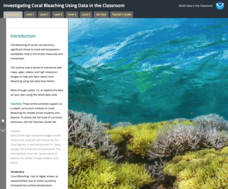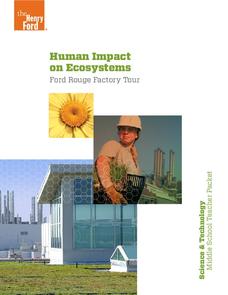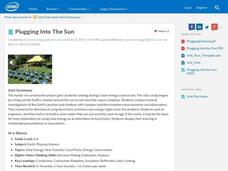Institute of Electrical and Electronics Engineers
Biomimicry in Engineering
Take a look with your class at how nature supplies inspiration to engineers. In cooperative groups, youngsters research biomimicry and then develop a system that would help support people living on the moon. Each team also considers...
Institute of Electrical and Electronics Engineers
Can You Canoe?
A neat handout immerses learners in the history of canoe making. After reading, small groups of mini engineers work to craft a canoe that will not be immersed! This is an ideal exercise in engineering design for your STEM curriculum or...
Institute of Electrical and Electronics Engineers
Engineered Music
Sound engineers investigate the structural design of a musical instrument, the recorder. They work in collaborative groups to choose an instrument to build out of everyday craft materials. It must be able to repeat a three-note sequence...
Institute of Electrical and Electronics Engineers
Playing with Parachutes
This lesson certainly will not be a drag! Little engineers design parachutes that make use of air resistance and, as a result, slow the descent of the payload as much as possible. It is an opportunity to teach about many motion concepts:...
Institute of Electrical and Electronics Engineers
Waterproof that Roof!
Stop the raindrops from getting into the house! Eager engineers learn about roofing history and waterproofing by nanotechnology. They get into groups and work on designing a waterproof roof for a small model house. The accompanying...
Institute of Electrical and Electronics Engineers
Making Sense of Sensors
Have small groups in your class construct working hygrometers as an example of the benefits of using sensors in engineering. This activity can be used during a weather unit when covering humidity or in a STEM activity as a preparation...
Institute of Electrical and Electronics Engineers
Be a Scanning Probe Microscope
Extensive reading is done in order to learn about scanning probe microscopy and nanoscale. Afterward, individuals use a pencil to probe an unidentified object that is inside of a box so that they cannot see it. Using only what they could...
Institute of Electrical and Electronics Engineers
Robot Basketball
Hold a free-throw shooting challenge in your engineering class! Each team must design a contraption that will fire off a "robot arm" or, more specifically, a catapult, to send a Ping-Pong ball into a basket. Use this as an opportunity to...
Institute of Electrical and Electronics Engineers
Radio Reception and Transmission
After reading about radio transmission, application, and the difference between AM and FM, small teams of engineers use a kit to construct an FM radio and then send and receive broadcasts. This is an ideal activity for middle school STEM...
Institute of Electrical and Electronics Engineers
Chair Lift Challenge
During the Winter Olympics, this would be an engaging task to include in your STEM lesson. Design teams plan, construct, and test a miniature ski lift that can carry a pingpong ball up and down a rope line without falling out. With this...
Institute of Electrical and Electronics Engineers
Shake it up with Seismographs!
Shake things up in your STEM or earth science classroom when you have small groups construct their own seismographs. A reading assignment on the history of seismographs, the Richter scale, and current technology sets the stage for the...
Institute of Electrical and Electronics Engineers
Pendulum Time
Take your time with this lesson. Junior engineers read about different types of clocks and then work together to build a pendulum time-keeper. There are no hints as to how they might go about accomplishing this complex task, so you may...
Curated OER
How Will We Create a Future without Waste?
Many young people act globally by reducing, reusing, and recycling, Now they take it to the next level by upcycling. Middle schoolers design a proposal to eliminate waste by exploring the new material cycle and applying their knowledge...
NOAA
Investigating Coral Bleaching Using Data in the Classroom
Approximately 93 percent of the individual reefs in the Great Barrier Reef suffer from coral bleaching. Scholars learn how scientists monitor coral bleaching around the world as part of a larger series. They use actual data to answer...
Constitutional Rights Foundation
Global Warming and the Paris Agreement
Global warming: a political debate or a scientific fact? Young historians read text, complete activities, and participate in group discussion to understand the political debate surrounding global warming and the US decision to withdraw...
NASA
Exploring Exoplanets with Kepler
Calculate the movement and properties of planets like professional astronomers! Scholars use Kepler's third law to find Mercury and Venus's distance from the sun. Using changes in brightness of distant stars and Kepler's third law,...
T. Smith Publishing
Types of Energy Word Search
Intended for science instruction, this word search could be used to reinforce vocabulary. Class members find the following words: electrical, potential, heat, chemical, gravitational, kinetic, mechanical, nuclear, and radiant. While the...
Intel
Starquest
Almost every ancient culture observed the stars and saw pictures in the patterns. Studying stars allowed them to guide travelers, determine when to plant crops, when to harvest food, and the stories surrounding the images include some of...
Intel
Insects: The Good, The Bad, The Ugly
What would the world be like with no insects? Ponder this question using a research-based STEM unit that encourages scholars to investigate insects from both a beneficial and hazardous perspective. They learn about insect behaviors,...
Curated OER
Whirligig Lollapalooza
Using a cut-out template of a whirligig, emerging engineers experiment with flight behavior. After you teach them the concepts of force, air resistance, and lift, they discuss what variables on the whirligigs might be changed in order to...
Curated OER
Moon Watch: Observing the Lunar Phases with a Model
How do you know the moon is going broke? It's down to its last quarter. The lesson provides a more accurate way to teach lunar phases, emphasizing not only naming or understanding them, but being able to explain why they occur....
North Carolina State University
Exploring Genetics Across the Middle School Science and Math Curricula
Where is a geneticist's favorite place to swim? A gene pool. Young geneticists complete hands-on activities, experiments, and real-world problem solving throughout the unit. With extra focus on dominant and recessive genes, Punnett...
Henry Ford Museum
Human Impact on Ecosystems
An environmenta science unit includes three lessons plus a cumulative project covering the ecosystem. Scholars follow the history of the Ford Rouge Factory from its construction on wetlands and how it destroyed the environment to its...
Intel
Plugging into the Sun
What's cooking? A sizzling STEM unit challenges scholars to build a solar cooker that can successfully cook an egg. The unit opens with a study of Earth's rotation, the sun's energy, and shadows. Pupils use a compass and thermometer to...
Other popular searches
- Common Core Language Arts
- Common Core Math
- Common Core Reading
- Common Core Standards
- Common Core Social Studies
- Common Core Writing
- Common Core Math Lessons
- Science Common Core
- Common Core English
- Common Core Ela
- Common Core Lessons














